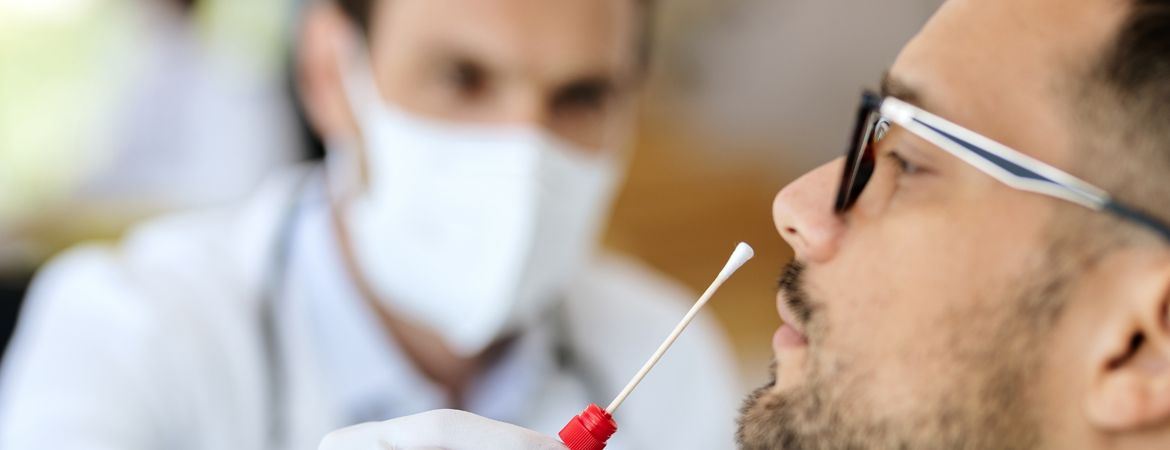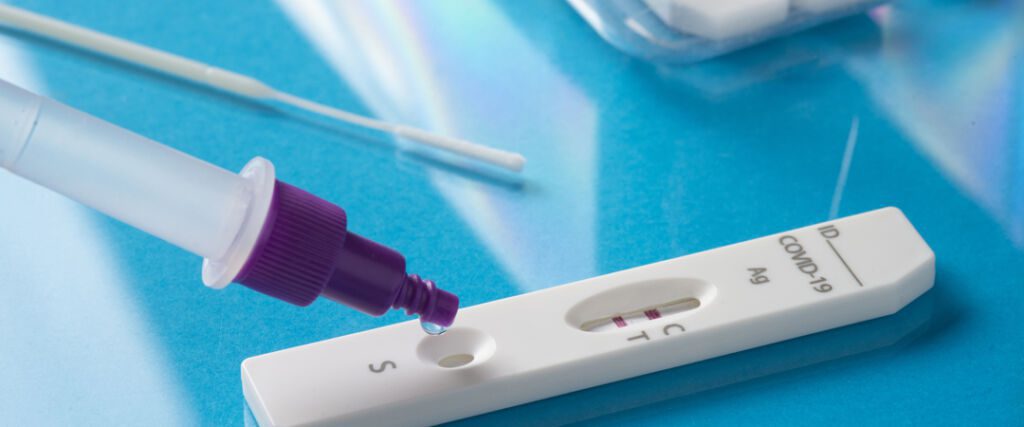
The PCR test is an essential tool for diagnosing viral infections, including COVID-19. In this guide you’ll find out everything you need to know about the PCR test, how it works, how to perform it and how to interpret the results.
WHAT IS THE PCR TEST?
The PCR (polymerase chain reaction) test is a molecular diagnostic technique used to detect the presence of viral or bacterial DNA or RNA in a biological sample. The technique is highly sensitive and can detect small amounts of viral or bacterial genetic material, making it an essential tool for diagnosing viral infections, including COVID-19. The PCR test is currently one of the most reliable tests for the detection of COVID-19.
HOW DOES THE PCR TEST WORK?
The PCR test works by amplifying small amounts of DNA or RNA present in a biological sample, such as blood, saliva or nasal secretions. The process involves several steps, including collecting the sample, extracting the DNA or RNA, preparing the sample for the polymerase chain reaction, amplifying the DNA or RNA, and detecting the result. The PCR test is highly sensitive and can detect small amounts of viral or bacterial genetic material, making it an essential tool for diagnosing viral infections, including COVID-19.
WHEN IS THE PCR TEST USED?
The PCR test is used to diagnose viral infections, including COVID-19, when symptoms are present or infection is suspected.
It can also be used to monitor disease progression and evaluate the effectiveness of treatment. This test is often used to confirm the diagnosis of a disease, such as HIV or hepatitis C, or to determine whether a person has been exposed to sexually transmitted infections (STIs).
In addition to their use in medicine, PCR tests are also used in forensic medicine and paternity testing. The test works by placing a DNA sample in a machine that replicates DNA fragments until they are large enough to be identified. The results are then compared to known DNA samples.
The PCR test is considered to be one of the most reliable tests for detecting viral infections, but it is important to note that it can sometimes give false negative or false positive results.

COVID-19 AND PCR TEST:
COVID stands for chronic obstructive pulmonary disease. This is a disease that causes breathing difficulties. Over time, it causes irreversible, life-threatening damage to the lungs.
The most common symptoms of chronic obstructive pulmonary disease are:
- Tiredness, especially after exercise.
- Shortness of breath during physical activity or when lying down (orthopnea).
- Cough, which may be dry or productive (mucus reflux).
- Wheezing at rest or during exercise.
EFFICACY OF THE PCR TEST FOR COVID-19:
The effectiveness of the PCR test for COVID-19 has been demonstrated in a number of studies. The most recent was published in the New England Journal of Medicine (NEJM). The study involved patients from several sites around the world and included 2,000 patients who were tested for COVID-19 using both PCR and other methods.
The researchers found that 91% of patients with COVID-19 tested by PCR were identified as positive or negative. This is a high level of accuracy, which means that if you test positive for COVID-19 by PCR, your chances of having the virus are very high (91%).
HOW SHOULD I PREPARE FOR A PCR TEST?
Before a PCR test, it’s important to follow your healthcare provider’s instructions. This may include not eating or drinking for a period of time before the test, not smoking or brushing your teeth just before the test, and wearing a face mask to reduce the risk of spreading the disease. It’s also important to report any symptoms and follow any quarantine or isolation instructions if you’ve been exposed to the disease.
WHAT ARE THE POSSIBLE RESULTS OF THE PCR TEST?
PCR test results can be positive, negative or indeterminate. A positive result means that the virus was detected in the sample. A negative result means that the virus has not been detected in the sample. An indeterminate result means that the test could not determine whether or not the virus was present in the sample. It’s important to discuss the results with your healthcare provider to understand what they mean for your health and what action you should take.
WHAT IS THE DIFFERENCE BETWEEN PCR AND ANTIGEN TESTS?
PCR is a test that looks for specific DNA sequences in your blood sample, while antigenic testing is another way of determining whether you’ve been exposed to a virus.
PCR stands for polymerase chain reaction, a test that detects very small amounts of DNA or RNA in your blood sample. This test is usually done if you have symptoms that suggest a particular illness, such as:
- Fever and headache
- Lack of energy (tiredness)
- Sore throat (pharyngitis)
- Rash on the trunk or limbs
You ask, our teams answer.
F.A.Q
The time it takes to get results can vary depending on the laboratory and the request. In general, it can take from a few hours to a few days. In some cases, results can be obtained more quickly using rapid PCR tests.
COVID-19 PCR tests are available from many healthcare facilities, clinics, testing centres and some self-testing sites. Your doctor may be able to refer you to a testing site.
You should have a COVID-19 PCR test if you have symptoms of the disease, if you have been in close contact with someone who has tested positive, or if you have travelled to a high-risk area.
COVID-19 PCR tests can be slightly uncomfortable because a swab is inserted into the nose or throat to take a sample. However, the pain is usually temporary and mild.

